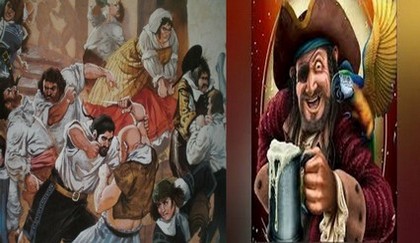For pirates, alcohol meant life. A half-starved life in the damp and storms was exhausting. Drinking water was always in short supply, and river water was dangerous, especially in the rainy season, because of the rotting corpses of animals and fish. Such water had to be boiled before cooking, and this was very difficult to do on board. Pirates lived by plunder, and the most coveted booty was a shipload of liquor. Alcohol was more valuable than fresh water and often more expensive than other trophies. The alcohol warmed the body and blood, prolonged life, and disinfected, and healed wounds. The Spanish and French carried wine to their overseas colonies, while the English carried beer and gin. During the long weeks at sea, all this liquid goodness would sour, and in the warm Caribbean waters, the wine soured especially quickly.
The pirates spotted local Mayan peasants making a low-alcohol drink. They poured water into a barrel and added several dozen peeled bananas. Under the hot sun, the mixture began to ferment and after a few days, they had a low-alcohol drink. The peasants called it chicha. Although it was cloudy, it killed all germs. The pirates began to add crushed sugar cane to the drink to make it stronger, and, satisfied with the result, realized that this “chicha” could replace capricious overseas wine.
In 1650, a military expedition sent by Cromwell recaptured the island of Jamaica from the Spanish. Henry Morgan was a soldier of this expedition, and from then on his life was connected with Jamaica, and soon he became the captain of a ship, then admiral of the whole fleet, and the favorite of all the pirates of the Caribbean Sea. Twenty years later, after many successful raids on Spanish settlements and forts and a raid on Panama, Henry Morgan was knighted by the King of England and appointed Governor of Jamaica.
At the time of his appointment, Morgan already owned extensive sugar cane plantations on the island. The new governor of Jamaica began exporting sugar to England and was the first to distill and export Jamaican rum to America and Europe. Morgan’s original Jamaican rum was almost black, thick, and very strong. It was later diluted with ginseng tincture, which gave the rum a deep ruby color, spicy flavor, and aroma. Before Jamaica, Barbados produced strong alcohol from sugar cane molasses in 1640 and this was the first Caribbean rum. Thanks to Sir Henry Morgan, his Jamaican rum was recognized as the best in the world and became popular with drinkers and confectioners alike.
The second most popular Caribbean drink was and still is, punch, a mixture of strong rum and fruit juice or brewed tea. Punch has the insidious property of knocking you down, like a punch in boxing. The drink is popular throughout the Caribbean and all taverns are still called “punch houses”.
Punch became even more popular in the 1930s with the advent of Coca-Cola. At that time, the Coca-Cola drink was made from coca leaves, which contained the essential oil of cocaine. These leaves were chewed by plantation workers throughout the day to maintain their vitality. Rum mixed with the original Coca-Cola gave a quick ‘buzz’ to the head. Although today’s Coca-Cola has nothing to do with the original, the carbon dioxide in this sticky soda still delivers rum dope to the brain in a matter of minutes.
The most piratical was a hellish mix of rum, beer, gin, and raw eggs called the Kill Devil. The craziest drinkers would add gunpowder to the mug, causing the drinker’s eyes to pop out of their sockets. It was the drink of a bloodthirsty pirate cutthroat nicknamed “Blackbeard” who terrorized the entire East Coast from Florida to North Carolina. The descendants of the pirates who live along the coast still drink this ‘kill devil’ mix, probably in memory of their ancestors.
There is a historical episode associated with this devilish drink. After the signing of the peace treaty between England and Spain, missionaries visited Jamaica. Familiar with the popular Kill Devil cocktail, they were genuinely surprised that the island’s inhabitants were still alive.
But maybe the owners should return this punch to their bars? After all, it’s an exotic drink that will bring not just money but popularity to the place. Tasting such a hellish potion will be remembered by the guests, and their stories will attract new curious people. After all, pumping banknotes from the pockets of ordinary people is the essence of any business…!

Hello there, just became alert to your blog through Google, and found that it is informative.
I am going to watch out for Brussels. I’ll appreciate it if you continue this in the future.
A lot of people will benefit from your writing.
Cheers!
Very interesting details you have mentioned,
thank you for putting up.